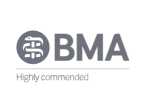Providing treatment options for your patient with headaches
Increase treatment success by knowing the options and setting reasonable goals for your patients with headaches.
Editors:Shelley Jacobs, PhD
Peer reviewers:Franz Wiesbauer, MD MPH Internist
Last update26th Nov 2020
In order to devise a treatment plan for your patient, first you must help your patient set goals for treatment. What are reasonable goals?
There are three reasonable goals for a treatment plan for your patient with headaches:
- To reduce use of abortive treatments and increase their efficacy
- To reduce headache disability
- To establish pain control and lower stress
Your patient may indicate a preference for pharmacological or non-pharmacological therapy. You may find many patients are not receptive to prescription drugs and become overwhelmed by potential side effects, preferring instead to at least try remedies that they consider more natural. These may be supplements and / or lifestyle alteration.
If your patient does not wish to try a pharmaceutical intervention, there are many non-pharmacologic treatments that you can recommend:
- Get adequate sleep
- Practice yoga / meditation
- Attend therapeutic massage treatments
- Use essential oils such as peppermint oil
- Exercise
- Wear sunglasses
Figure 1. Non-pharmacologic treatments for headache include adequate sleep, yoga / meditation, therapeutic massage, essential oils, exercise and wearing sunglasses.
Become a great clinician with our video courses and workshops
Recommended reading
- Blumenfeld, AM. 2018. Botox for chronic migraine: Tips and tricks. Practical Neurology. 17: 27–36. https://practicalneurology.com
- Halker Singh, RB, Starling, AJ and VanderPluym, J. 2019. Migraine acute therapies. Practical Neurology. 17: 63–67. ttps://practicalneurology.com
- Krel, R and Mathew, PG. 2019. Procedural treatments for headache disorders. Practical Neurology. 17: 76–79. https://practicalneurology.com
- Mauskop, A. 2012. Nonmedication, alternative, and complementary treatments for migraine. Continuum (Minneap Minn). 18: 796–806. PMID: 22868542
- Motwani, M and Kuruvilla, D. 2019. Behavioral and integrative therapies for headache. Practical Neurology. 17: 85–89. https://practicalneurology.com
- Natekar, A., Malya, S., Yuan, H. & Nahas, S. 2018. Migraine Preventative Therapies in Development Practical Neurology. 17: 54–57.
- Parikh, SK and Silberstein, SD. 2018. Calcitonin gene-related peptide monoclonal antibodies. Practical Neurology. Feb: 20–22. https://practicalneurology.com
- Rizzoli, PB. 2012. Acute and preventative treatment of migraine. Continuum (Minneap Minn). 18: 764–782. PMID: 22868540
- Tepper, SJ and Tepper, DE. 2018. Neuromodulation and headache. Practical Neurology. 17: 42–45. https://practicalneurology.com
Become an expert


Highly commended by the British Medical Association
Awarded in the “digital” category of the BMA Book Awards - London 2017

